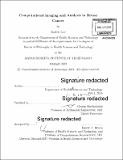Computational imaging and analysis in breast cancer
Author(s)
Lee, Justin Wu
DownloadFull printable version (18.26Mb)
Other Contributors
Harvard--MIT Program in Health Sciences and Technology.
Advisor
George Barbastathis.
Terms of use
Metadata
Show full item recordAbstract
The conventional pathologic analysis of malignancies involves a qualitative characterization and integration of several factors including tumor size, general degree of differentiation, tumor heterogeneity, mitotic rate, and lymphovascular invasion. For some cancers, biomarkers such as hormone receptor expression or receptor kinase over-expression can provide additional prognostic and therapeutic guidance. Unfortunately, all of these qualitative histologic approaches, while generally accepted for directing patient care, often exhibit significant inter-observer variability resulting in inconsistent inter- and intra-institutional predictions of tumor behavior (including metastases and/or recurrence), resulting in incorrect diagnoses or treatment. Because cellular morphology is an integrated reflection of genetic and epigenetic expression, we hypothesize that a more accurate quantitative accounting and measurement of histologic features can provide a more robust and reliable prediction of tumor behavior. Computational imaging utilizes software to augment or replace the role of traditional optical elements in imaging systems and has an ability to significantly increase the accuracy, robustness and cost-efficiency of digital pathology. In this thesis, we develop and test three novel computational imaging algorithms including, to the best of our knowledge, the first system for lensless computational imaging through deep learning. We then test our hypothesis by applying augmented image retrieval, analysis algorithms, and machine learning on a validated dataset of breast cancer images where the clinical outcomes of the primary tumor are known. In particular, we analyze algorithms related to identifying mitoses as a central proof of concept.
Description
Thesis: Ph. D. in Biomedical Engineering, Harvard-MIT Program in Health Sciences and Technology, 2018. Cataloged from PDF version of thesis. Includes bibliographical references (pages 125-136).
Date issued
2018Department
Harvard University--MIT Division of Health Sciences and TechnologyPublisher
Massachusetts Institute of Technology
Keywords
Harvard--MIT Program in Health Sciences and Technology.